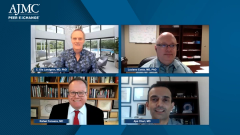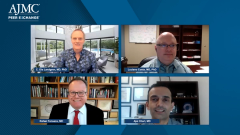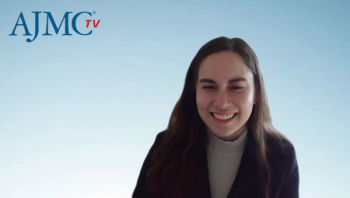
Therapy Selection for Newly Diagnosed Multiple Myeloma
Experts in the management of multiple myeloma discuss treatment selection for newly diagnosed patients, with consideration of the ENDURANCE trial and its shortcomings.
Episodes in this series

C. Ola Landgren, MD, PhD: The reason they invited all 4 of us is because we all have different opinions. If we all had the same opinion it would only be 1 of us; I did not tell you what I think.
Ajai Chari, MD: Yes, what do you do?
C. Ola Landgren, MD, PhD: You guys know what I think for the newly diagnosed. I, similar to Rafael and Luciano, would use carfilzomib. I would argue that there is not yet any correctly designed study to test VRd [bortezomib, lenalidomide, dexamethasone] versus KRd [carfilzomib, lenalidomide, dexamethasone]. In my opinion, the ENDURANCE trial is a failed study; they allowed patients to be randomized between VRd [bortezomib, lenalidomide, dexamethasone] and KRd [carfilzomib, lenalidomide, dexamethasone]. Once they were randomized they could change treatment and remain on the study. A patient could get 2 cycles of VRd [bortezomib, lenalidomide, dexamethasone] or 2 cycles of KRd [carfilzomib, lenalidomide, dexamethasone] and switch to something completely different, and still be counted as being part of what they were randomized to.
For example, VRd [bortezomib, lenalidomide, dexamethasone] we all know causes so much neuropathy, many of those patients in the study, and you can read the fine print, were switched to DRd [daratumumab, lenalidomide, dexamethasone]. You could argue that the study compares KRd [carfilzomib, lenalidomide, dexamethasone] to DRd [daratumumab, lenalidomide, dexamethasone]. Then with KRd [carfilzomib, lenalidomide, dexamethasone] they gave 13.5 liters of water; they couldn’t continue, so they didn’t get KRd [carfilzomib, lenalidomide, dexamethasone]. Maybe it’s DRd [daratumumab, lenalidomide, dexamethasone] versus DRd [daratumumab, lenalidomide, dexamethasone], who knows, because they were randomized to one of the 2 arms, but they were not declaring them.
Then they say, “Oh, we took care of it by censoring the data.” If they changed the treatment, then they were taken out of the analysis, and they only looked at those people who could stay on VRd [bortezomib, lenalidomide, dexamethasone] and KRd [carfilzomib, lenalidomide, dexamethasone]. Now we are comparing people who do well on either therapy; of course, they are going to have the same outcome. What they should have done is they should have counted change of therapy as either time to treatment failure or event-free survival. We actually did that analysis, and it’s in a “Letter to the Editor” of The Lancet Oncology. The P value is .00001 in favor of KRd [carfilzomib, lenalidomide, dexamethasone].
We need a new study that will look at PFS [progression-free survival] when you count change of therapy as an event; or you should do event-free survival; or you should do PFS and you should openly disclose this insensitivity analysis. Those are my 2 cents, along those lines. I think the race is still on; I don’t think this study answered anything that was relevant, in my opinion.
Ajai Chari, MD: Ola, I think some of the work that both you and Luciano have done is the anticoagulation, and can you comment on that? If you’re going to use the K [carfilzomib] with the frontline LEN [lenalidomide], then it’s an important topic that people may not recognize.
C. Ola Landgren, MD, PhD: That’s an important question. I think fluid is the key component. In my practice, I only give 2...I’m such a wimp, I had so many problems when I started with KRd [carfilzomib, lenalidomide, dexamethasone] in my first trials in 2010; I had too much fluid. I only give 250 cc saline before dose 1; that’s it. I stop all the IV [intravenous] fluid because I had problems. I don’t give it with dose 2, 3; I give it first, water. I only give [the regimen] once a week, and I give usually 56 [mg]. Whether I do it with an IMiD [immunomodulatory imide drug] or DARA [daratumumab], I give 56 [mg]. I think that’s a much safer dose. Once a week is very safe and little fluid. Then for anticoagulation; I don’t believe in aspirin. I had so many DVTs [instances of deep vein thrombosis], so I switched our entire program to oral factor Xa [inhibitors]; I give 10 mg of rivaroxaban, or Xarelto, once a day. I have not seen a DVT for a long time; what do you do?
Luciano Costa, MD, PhD: That was a great question, Ajai. I make the mistake of looking down on this issue; as a field we have not paid enough attention. When we designed the MASTER trial, we essentially went with the IMWG [International Myeloma Working Group] consensus recommendations; which most people got aspirin.
I agree; it’s greatly inadequate. We had a couple episodes of grade 3, and we had even 1 episode of grade 4, venous thromboembolism [VTE]. Of course, our first reaction is to treat with a drug, and sadly that is a culprit both with IMiDs and probably with carfilzomib.
I’m starting to suspect more and more that the fast reduction of disease burden is a culprit. I think the rapid tumor reduction is very thrombogenic.
The worst episodes we have had were always cycle 1 or cycle 2 on people who had astonishing, quick and deep responses. It’s something we would like to understand better, particularly now that we’re going to have more highly active regimens in the upfront setting.
I agree with you; I think aspirin is easy to beat as VTE [venous thromboembolism] prophylaxis in the newly diagnosed, highly active setting. I’d love to hear Ajai and Rafael, your own practice.
Ajai Chari, MD: I am using DKd [daratumumab, carfilzomib, dexamethasone], so I don’t worry about it. I agree with you; if ENDURANCE had been done with limited fluids and better anticoagulation, I think that might read out differently. The other thing that I would throw in there is cost. In a way the ENDURANCE [trial] is already an obsolete question because it’s really quad [quadruplet therapy], and we’ll certainly talk about it. If you’re going to use a CD38, and you’re going to use LEN [lenalidomide] and DEX [dexamethasone], then the question is: What is the added value of carfilzomib at 56 mg/m² versus bortezomib?
The other final point is: we talk about these clinical trials but in the real world people aren’t really doing twice weekly of anything. These studies are really hard to generalize to what’s happening in clinic.
C. Ola Landgren, MD, PhD: Rafael, what is your approach here?
Rafael Fonseca, MD: I have a couple of comments. First on the ENDURANCE trial; Ola, you and I use it, but I know a lot of people have a different interpretation of ENDURANCE. If you take the most conservative interpretation of the data, it’s a large study, it’s a randomized phase 3 trial with over a thousand patients, and it has those caveats.
It was really assigned to test the superiority of carfilzomib. Let’s say that, with the caveats accepted or not, it failed. It doesn’t really state that K [carfilzomib] is not an effective frontline regimen; it just portrays what the aspect might be. In my mind then, that all resides in tolerability and toxicity; that’s why I use that factor. Even though I suspect that’s the case, I don’t think I have any data with phase 3 that tells me that K [carfilzomib] is going to be a better drug. I see a lot of indirect data, so that becomes problematic to me. If you accept that they’re the same, and if you used the most conservative approach, to me the toxicity tradeoffs are what make me lean in favor of K [carfilzomib].
There’s one thing that Luciano said that is so interesting to me; I am also really bothered by the things we see and we suspect; we see the writing on the wall. We see the weather changing, but it takes a while before we change our practices; I’m really bothered by aspirin. I still see DVTs. I’ve been wondering for a while, why haven’t we switched to a DOAC [direct oral anticoagulant]?
I’ve done that with a blended approach, but I think everyone should be on a DOAC right now. Meetings like this change your mind, right? What else is bothering me? Why are you still using 3 drugs sometimes for frontline therapy? It’s a little bit harder with DARA KRd [daratumumab, carfilzomib, lenalidomide, dexamethasone], but let’s say, why are you still doing that?
Let me just say something very simple; antibiotics. We have a British study up front, for 12 weeks. What’s magical about 12 weeks? The nurses ask me, “Patients are going into the hospital with pneumonia; should our patients always be on antibiotics?” I don’t have the answer to that, but what I can tell you is conversations like these make me really uncomfortable because I know there’s probably some truth in those things that we suspect.
C. Ola Landgren, MD, PhD: Before I move on and talk about the next study, APOLLO, and I want to direct that to you, Rafael. I want to close up the discussion we have had back and forth on carfilzomib up front. I was thinking about it here from what you said in your last comment, Ajai, on the complexity of the therapies and the [adverse] effects. I think it’s a fair statement to say that as these therapies are getting better with more powerful drugs, what we have discussed about the hypocoagulation and other issues, if the doctors who treat the patients are not aware of all these important details, a better therapy can take you in the wrong direction.
Coming back to the ENDURANCE trial, I gave pretty harsh criticism. If you look up the study in the paper and see, out of those thousand patients that Rafael said were enrolled, roughly 51% of the sites treated 1 patient. What quality data do you actually have if you have so many sites that only enrolled 1 or 2 patients? That’s going to affect the study results as well. It’s reflective of the fact that these very powerful therapies are great in the hands of centers that know how to do it, but they may not work in the real world; those are my 2 cents. What do you think about that Ajai?
Ajai Chari, MD: We must keep in mind that in the relapsed setting, probably 50% to 75% of real-world patients aren’t even eligible for studies. Between the blood counts, the renal function, comorbidities, frailty. It’s hard to generalize, and there’s no question; DKd [daratumumab, carfilzomib, dexamethasone] is an amazing combination. However, there are lot of nuances that we’ve talked about, and it might not be well appreciated. Above all else we want our patients to live long and prosper, and not be having toxicities and early complications. If you have to really explain all of those nuances, you have to detail it out, because the reality is if a regimen is deliverable, the protocol should specify all the supportive care such that it shouldn’t matter if you only gave it to 1 patient.
Newsletter
Stay ahead of policy, cost, and value—subscribe to AJMC for expert insights at the intersection of clinical care and health economics.









